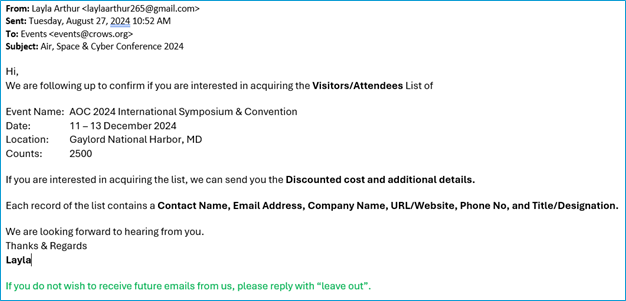Attendee List Scams
As an exhibitor (or even attendee), you may receive emails and phone calls from various companies offering to sell an event’s “attendee list.” This scam affects trade associations nationwide, with scammers primarily phishing for personal information.
These companies are NOT affiliated with the event and are NOT authorized to contact exhibitors. Do not reply to these requests.
Key Points to Keep in Mind:
- Nearly all third parties offering to sell attendee lists are engaging in a scam. Do not respond to the email or purchase these lists.
- We have secure controls in place to securely manage our data – no actual data has been acquired by these scammers.
- We take protecting your data seriously. Learn more by reading our Privacy Policy: https://crows.org/privacy-policy/
- Your best course of action is to file a report with the Federal Trade Commission. See how to do that below.
Are you receiving email offers to purchase attendee lists? They actually want you to respond to “opt out” in order to validate your information.
Here’s how the scam works.
Scammers utilize web crawlers or email “scraper” programs to gather data from social media platforms like LinkedIn and Facebook. They seek out information such as exhibitor lists and the interactive floor plan, readily available on Google, to pinpoint target companies. Analyzing the email patterns of these companies, scammers test various formats and send out phishing emails to verify valid addresses. Subsequently, they launch mass email campaigns to assess the legitimacy of the gathered email addresses.
Here’s an example of what an attendee list scam email might look like.

The very last sentence of the email written in green text says, “If you do not wish to receive future emails from us, please reply with ‘leave out’.” This is a clever way to get you to respond so that the sender can confirm that your email is valid. Your best course of action is to not respond.
What You Can Do:
- If you receive an attendee list scam email, do not respond or engage with the sender. Instead, follow your organization’s policy for reporting SPAM. You can also block the sender email.
- File a report. The Federal Trade Commission (FTC) has created a new process for individuals and companies to report these activities. The FTC will share these reports with their law enforcement partners to help with investigations and stop these practices.
How to file a fraud report:
- Go to Federal Trade Commission: https://reportfraud.ftc.gov
- Click on “Report Now”
- For Question 1: “Is your report about any of these common problems?”
Select “An Impersonator” (top left answer) - For Question 2: “Who were they pretending to be?”
Select “Well-known or trusted business” - Click “Continue”
- Add as much information as you have and submit!
Additional resources
Trade Show News Network (TSNN) has thoroughly investigated this scam and offers invaluable advice. https://www.tsnn.com/experts-opinions/investigation-fake-list-vendors
FTC Announces Impersonation Rule Goes into Effect Today | Federal Trade Commission
